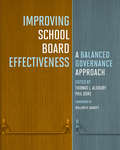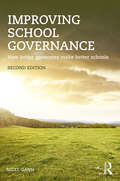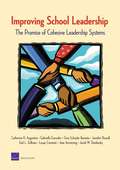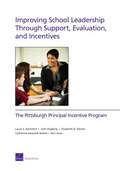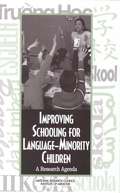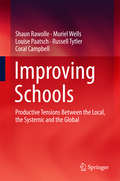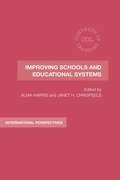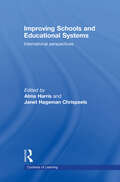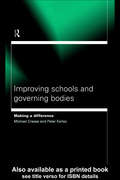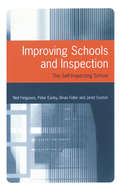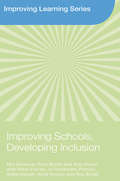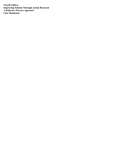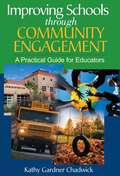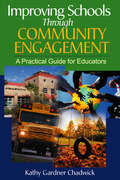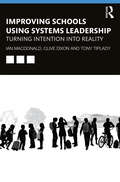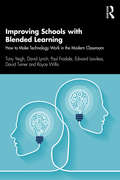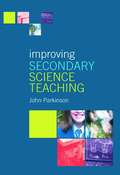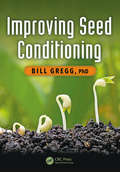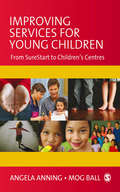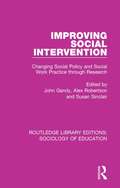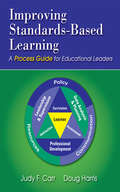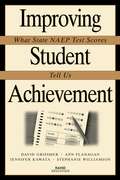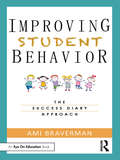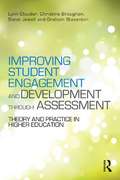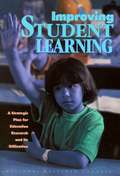- Table View
- List View
Improving School Board Effectiveness: A Balanced Governance Approach
by Thomas L. Alsbury and Phil GoreImproving School Board Effectiveness offers a clarifying and essential look at the evolving role of school boards and how they contribute to efforts to improve student learning. It examines how board members can establish effective district priorities, and it explores those board policies and actions that result in shared, districtwide commitments to heightened student achievement. This book arises out of a critical need for a better understanding of school boards and the development of helpful tools and guidelines for school board members. At its heart is the notion of Balanced Governance, a principle that most generally &“balances the authority of a superintendent to lead a school district with the necessary oversight of a locally engaged and knowledgeable board.&”Improving School Board Effectiveness is a helpful and practical book that will prove indispensable for school board members, school and district administrators, and everyone with a stake in school improvement and reform.
Improving School Governance: How better governors make better schools
by Nigel GannAbout the first edition: "School governors will find this a sound and practical guide to the nature of their responsibilities and the process of managing their workload. It is well researched, based on vast experience, illustrated from the best practice, free from jargon – and always interesting." Joan Sallis. Described by the National Association of Governors and Managers as "definitely a ‘must’ for your bookshelf"; reviewed in the Times Educational Supplement as an "essential guide to help governors". This book is about governing schools – about how a governing board made up largely of ‘ordinary’ people with no professional educational experience, working in partnership with professional leaders, can help to make schools better. It is intended for governors in schools in England and Wales, in other parts of the world where lay people engage in school leadership, and for people who work with governors. Improving School Governance examines: How school governors got to be where they are today How governing boards do their jobs How individual governors can best contribute to their schools Governors’ accountability The nature of governors’ meetings The rights that governors have The relationships between governors and the headteacher The role of governing boards in school inspection Governors’ relationships with parents and the wider community How to evaluate the performance and impact of governing boards What the future might hold for state-funded schools and their governance What national strategic issues will need to be addressed by governing boards in the next five to ten years
Improving School Leadership: The Promise of Cohesive Leadership Systems
by Gail L. Zellman Gina Schuyler Ikemoto Catherine H. Augustine Jennifer Russell Gabriella GonzalezThis study documents actions of Wallace Foundation grantees to create more-cohesive policies and initiatives to improve instructional leadership in schools; describes how states and districts have worked together to forge such policies and initiatives; and examines the hypothesis that cohesive systems improve school leadership. Such efforts appear to be a promising approach to developing school principals engaged in improving instruction.
Improving School Leadership Through Support, Evaluation, and Incentives: The Pittsburgh Principal Incentive Program
by Laura S. Hamilton John Engberg Elizabeth D. Steiner Catherine Awsumb Nelson Kun YuanThis report examines Pittsburgh Public Schools' implementation and outcomes of the Pittsburgh Principal Incentive Program from school years 2007-2008 through 2010-2011, how principals and other school staff have responded to the reforms, and what outcomes accompanied program implementation.
Improving Schooling for Language-Minority Children: A Research Agenda
by Committee on Developing a Research Agenda on the Education of Limited-English-Proficient Bilingual StudentsHow do we effectively teach children from homes in which a language other than English is spoken?In Improving Schooling for Language-Minority Children, a committee of experts focuses on this central question, striving toward the construction of a strong and credible knowledge base to inform the activities of those who educate children as well as those who fund and conduct research.The book reviews a broad range of studies--from basic ones on language, literacy, and learning to others in educational settings. The committee proposes a research agenda that responds to issues of policy and practice yet maintains scientific integrity.This comprehensive volume provides perspective on the history of bilingual education in the United States; summarizes relevant research on development of a second language, literacy, and content knowledge; reviews past evaluation studies; explores what we know about effective schools and classrooms for these children; examines research on the education of teachers of culturally and linguistically diverse students; critically reviews the system for the collection of education statistics as it relates to this student population; and recommends changes in the infrastructure that supports research on these students.
Improving Schools
by Coral Campbell Russell Tytler Louise Paatsch Muriel Wells Shaun RawolleThis unique book explores school improvement policy - from its translation into national contexts and school networks to its implementation in leader and teacher practices in individual schools and classrooms within this network of schools and its impact on students' learning. It draws on multiple conceptual and theoretical resources to explore the complexities attached to a school improvement process in a network of schools in Australia. These conceptual and theoretical resources include discourse, practice, representation and network, concepts common to both policy research as well as studies of leadership and classroom practice. They lead to a more detailed understanding of the intersections between educational policy and intervention processes, and the complex reality of school processes and teaching practices. In the book we trace the implementation of school improvement policies through its multiple phases, levels and contexts. Our data-collection and analysis methods draw on a variety of perspectives in the way different players perceive their roles and the nature of the initiative and the ways in which these intersect. The research findings are used to seek productive approaches to school improvement that combine policy integrity with local flexibility. The book contributes to the school improvement literature through its exploration of tensions between global and systemic settings and local practices and histories.
Improving Schools and Educational Systems: International Perspectives (Contexts of Learning #Vol. 17)
by Alma Harris Janet H. ChrispeelsSchool improvement has become a dominant feature of educational reform in many countries. The pressure upon schools to improve performance has resulted in a wide-range of improvement programmes and initiatives which can provide both inspiration and advice to everyone involved in school improvement. This book draws together the most effective school improvement projects from around the world in one comprehensive text, including detailed comparative analysis of a wide variety of initiatives. Drawing on examples from the UK, the USA, Canada, South Africa and Australia this book gives both an international snapshot and a coherent synthesis of initiatives that have given achievable results.
Improving Schools and Educational Systems: International Perspectives (Contexts Of Learning Ser.)
by Alma Harris Janet H. ChrispeelsSchool improvement has become a dominant feature of educational reform in many countries. The pressure upon schools to improve performance has resulted in a wide-range of improvement programmes and initiatives which can provide both inspiration and advice to everyone involved in school improvement. This book draws together the most effective school improvement projects from around the world in one comprehensive text, including detailed comparative analysis of a wide variety of initiatives. Drawing on examples from the UK, the USA, Canada, South Africa and Australia this book gives both an international snapshot and a coherent synthesis of initiatives that have given achievable results.
Improving Schools and Governing Bodies: Making a Difference
by Michael Creese Peter EarleyThis book provides school governors with a blueprint for working effectively and enthusiastically to bring about positive change in their schools, for the benefit of all those concerned.
Improving Schools and Inspection: The Self-Inspecting School
by Peter Earley Janet Ouston Neil Ferguson Brian Fidler`This is an important book, not least because OfTED may well have changed English schools more substantially than any previous curriculum development or assessment development programme' - Mentoring & Tutoring This book looks at the relationship between school inspection and school improvement. The authors show how heads have used inspectors' reports to put in place real school improvement. They deal with the contexts of inspection and comparisons are made with the Australian experience of school self-review. The book focuses on how schools have developed a culture of self-inspection. The authors consider the system of OfSTED inspections and ask how beneficial inspection has been in encouraging schools to develop and improve. They suggest there is need for a change and that there are alternative approaches to school assessment and improvement, which could be more effective. They argue that the school's own evaluation processes should play a greater part in the arrangements for inspection. Improving Schools and Inspection will be essential reading for headteachers and other professionals engaged in dealing with inspections.
Improving Schools, Developing Inclusion (Improving Learning)
by Mel Ainscow Alan Dyson Tony BoothWhile many books explore the possibilities for developing inclusive practices in schools, and ‘inclusion’ is widely regarded as a desirable goal, much of the literature on the subject has been narrowly concerned with the inclusion of pupils with special educational needs. This book however, takes the view that marginalisation, exclusion and underachievement take many forms and affect many different kinds of child. As such, a definition of inclusion should also touch upon issues of equity, participation, community, entitlement, compassion, respect for diversity and sustainability. Here the highly regarded authors focus on: barriers to participation and learning experienced by pupils the practices that can overcome these barriers the extent to which such practices facilitate improved learning outcomes how such practices can be encouraged and sustained within schools and LEAs. The book is part of the Improving Learning series, published in partnership with the Teaching and Learning Research Project.
Improving Schools Through Action Research: A Reflective Practice Approach
by Cher HendricksA brief, user-friendly, solid look at the action research cycle and the knowledge to work through each step. <p><p>In Cher Hendricks’s Improving Schools Through Action Research, educators learn what they need to know about the action research cycle and get practical help for working through each step of the cycle–from choosing a topic and generating research questions to analyzing data and reporting results and conclusions. In a clear, concise, user-friendly approach, the author helps readers through the entire process with specific, practical information that incorporates some of the latest online and professional resources, a more detailed explanation of how to analyze and interpret qualitative data, and instructions on formatting the research paper using the latest APA guidelines.
Improving Schools through Community Engagement: A Practical Guide for Educators (1-off Ser.)
by Kathy Gardner ChadwickEngage your community and help students achieve their full potential!Americans see public schools as a critical community resource and rank education as a priority second only to the economy. How can educators harness this public interest in education to bring parents, families, and communities to action for our schools? Improving Schools Through Community Engagement addresses these questions and more in this invaluable source of methods and strategies for educators to initiate action.Involvement of family and community members has a significant impact on student achievement. This handy resource provides a framework that education leaders can use in designing and implementing initiatives to more effectively engage the public by:* Framing a clear focus for community engagement* Identifying and including representatives from each diverse constituency group* Developing an understanding of the varied perspectives of these groups* Presenting strategies to encourage constituent involvement and actionA more engaged community results in improved teaching and learning. The energy of parents, teachers, and communities working together starts small and spreads over time. If everyone gets involved, the possibilities for action are limitless!
Improving Schools Through Community Engagement: A Practical Guide for Educators
by Dr Kathy Gardner ThomfordeHow can educators harness public interest in education to bring families and communities to action? This invaluable resource addresses initiatives to engage constituent involvement.
Improving Schools Using Systems Leadership: Turning Intention into Reality
by Ian Macdonald Clive Dixon Tony TipladyIt is easy to underestimate the impact that school organisation has on the behaviour, effectiveness, engagement and creativity of the teachers, staff and students who work within it. It also has a marked effect on the well-being of staff members, and how families and the community relate to the school. Attempts to improve school organisation are often short term "initiatives" that only cover only one or two aspects of what it takes to organise a school effectively. Improving Schools Using Systems Leadership, in contrast, provides those involved in the design and delivery of educational services with a coherent and easy-to-follow framework to help run an effective organisation. Based on theory, real data on education improvements at school and regional level, and case studies, this book demonstrates how Systems Leadership can be used to improve school organisation. It integrates models of leadership, teamwork, capability, structure and systems to help make them more effective in improving the learning outcomes of students and also sustain this improvement over time. This book explains how Systems Leadership can and has been applied in schools to bring clarity to the purpose, structure and systems within a school and have a major impact on its success. As such, it is an essential text for school leaders and managers looking for practical tools to help improve the working lives of the people within their organisation, and hence their effectiveness.
Improving Schools with Blended Learning: How to Make Technology Work in the Modern Classroom
by Tony Yeigh David Lynch Paul Fradale Edward Lawless David Turner Royce WillisImproving Schools with Blended Learning is specifically designed to address the important issues needed to successfully modernise education within the context of technological change. It does this by first providing a clear roadmap for designing Blended Learning environments able to respond to the technological imperatives challenging schools at present, and then illustrating this roadmap via specific, original research that details the 'how to' aspects of a successful technology-based design process. School leaders, teachers, teacher education students and researchers will all find highly relevant information about how to manage for disruption in the new and informative approach to Blended Learning (BL) they will discover in this book. This book arose from two different research projects the authors have been pursuing over the last 3–5 years, including school improvement research and Blended Learning research designed to investigate the role of technology in effective teaching and learning. By combining the insights gained from these two different research areas, this book is able to present a novel understanding of BL that is both insightful and clearly evidence-based. Improving Schools with Blended Learning also provides several original contributions to specific knowledge in the areas of BL and school improvement that most educators will find highly useful, including the use of BL schemas, a clear and extended BL continuum, how to measure and evaluate the success of BL, how to scaffold teacher ICT knowledge and skills, and a specific process for contextualising applied BL in relation to the ‘disruption’ imperatives of the Knowledge Economy.
Improving Secondary Science Teaching
by John ParkinsonImproving Secondary Science Teaching has been written to help teachers both new and experienced reflect on their current practice and consider how to improve the effectiveness of their teaching. The book examines each of the common teaching methods used in science in relation to pupils' learning and provides guidance on management issues and procedures.With underlying themes such as pupils' interest in science and their motivation to learn; how pupils learn science; the type of science currently being taught in school; and the value of educational research; the book includes chapters on: the improvement process planning for progression and continuity promoting pupils' learning dealing with differences making use of information from assessment learning about the nature of science This timely book will be of interest to practising science teachers, particularly those who are working to improve the management of science departments or their own teaching practice. It will also be a valuable resource for science education researchers and students on higher degree courses in science education.
Improving Seed Conditioning
by Bill GreggSeed conditioning is the final process that establishes the quality of a seed lot and determines its value. It is a complex process involving a significant series of machines, each of which must be used in the proper sequence of the entire process, and each machine must be carefully and properly adjusted and set up for each lot of seed. If the conditioning plant operator does not have sufficient knowledge of how to set up and adjust each of the machines, then an excessive amount of good seed is lost during conditioning and not all undesirable materials are removed. Therefore, the performance of seed conditioning depends entirely on how effectively the operator sets up and adjusts the machines. Much effort has been spent in developing seed technology so as to produce high quality seed, but performance of seed conditioning by maximizing the operator’s knowledge of getting the best performance from each of his machines has not been carefully and completely developed. Improving Seed Conditioning focuses on teaching the conditioning plant operator details of each machine and how to get maximum performance from it in terms of operating efficiency, maximum removal of undesirable particles, and minimum loss of good seed. Organized in a manner that focuses on the specific machine models installed in each operator’s specific plant, this manual is set up to be used as text material in training classes or as a guide for operators employed by seed companies.
Improving Services for Young Children: From Sure Start to Children's Centres
by Mog Ball Angela Anning'This book is a welcome addition to the field of Early Childhood studies and would appeal to both students and professionals working with children and families in any area. The format of the book is clear and the style of writing is very readable and engaging' - ESCalate ` In this excellent book two of the principal investigators from the huge national evaluation of Sure Start bring together key findings of ''what works'' as the local programmes are turned into children's centres and rolled out across England. Chapters on all aspects of Sure Start and children's centres reflect the services themselves in providing a valuable ''one stop shop'' for those who want to understand how to work effectively with young children and their parents' - Dame Gillian Pugh, Visiting Professor, Institute of Education, University of London This book sets out important insights gained from the National Evaluation of Sure Start (NESS). The contributors present the effects of Sure Start from a range of perspectives and explore the successful and problematic aspects of the programme with its vision of improving the life chances of the most disadvantaged families. They also map and evaluate the progression of the programme into Children's Centres and Extended Schools. Each contributor provides an overview of their specialist area before outlining the findings from the study and its implications for developing Children's Services. These areas include: - Ethnicity - Childcare - Parents - Special Needs - Maternity Services - Domestic Violence - Buildings and Spaces. The chapters set out the practical lessons learned from these areas for practitioners, professionals and policy makers in the field of children's services, as well as those involved in the setting up of Children's Centres and reform of multi-agency children's services. The book will be relevant to undergraduate students on Childhood Studies Degrees, Early Years Professional Foundation Degrees students, postgraduate students on National Qualification for Managers of Children's Centres and Masters related to Integrated Children's Services. It is also for those with an interest in anti-poverty intervention programmes for young children and their families around the world.
Improving Social Intervention: Changing Social Policy and Social Work Practice through Research (Routledge Library Editions: Sociology of Education #27)
by John Gandy Alex Robertson Susan SinclairThis book, first published in 1983, considers the whole problem of how social research can lead to improvement in practice in social policy and social work. In the first section, individual chapters discuss the political context within which research is commissioned and used, through consideration of the politics of comparative research and of the application of research findings to policy-making in the personal social services. The problems of putting policy into practice and using research in a systematic and predictable way for improving situation is also examined. This title will be of interest to students of the Sociology, Education and Social Policy.
Improving Standards-Based Learning: A Process Guide for Educational Leaders
by Judy F. Carr Douglas E. HarrisThis comprehensive resource provides ready-to-use tools to lead educators through the design, implementation, and evaluation of a high-quality, standards-based curriculum that significantly and positively impacts student learning.
Improving Student Achievement: What State NAEP Test Scores Tell Us
by Tom Latourrette Ann Flanagan Jennifer H. Kawata David W. Grissmer Stephanie WilliamsonWhy do students have different achievement levels across states? Is math achievement improving across states? Differences in average achievement levels across states are mainly traceable to differing family characteristics. However, students from similar families also score differently across states. These differences are related to differences in resource levels and in how resources are spent. States with high spending per pupil, lower pupil-teacher ratios, higher participation in public prekindergarten and higher reported teacher resources have higher achievement. Disadvantaged children are the most sensitive to low resource, and additional resources could substantially their scores. Between-state, rather than within-state, differences in resources appear to be the main reason for inequitable resource levels for students of lower socioeconomic status. The conclusion is that significant math gains are occurring across most states that cannot be traced to resource changes, that the rate of gain varies significantly by state, and that reform efforts are the likely cause of these gains. The results certainly challenge the traditional view of public education as unreformable.
Improving Student Behavior: The Success Diary Approach
by Ami BravermanWhat if you could use a handpicked set of tools to help children redirect their classroom behavior from dysfunctional to positive? Improving Student Behavior: The Success Diary Approach is a step-by-step guide to promoting your students’ personal development. This book introduces The Success Diary, a novel, easy-to-use method for involving students in their own behavior modification plans. Designed by an experienced school psychologist, this guide consolidates approaches from various schools of behavioral intervention and integrates them into a streamlined, adaptable framework for teachers looking to engage with children’s unique personalities, skills, motivations, and support systems to create lasting behavioral change. Through these flexible, common-sense guidelines and activities, you can empower your students to participate in working towards better behaviors and healthy social-emotional development.Check out the author's blog at https://materialpsychology.com/blog.
Improving Student Engagement and Development through Assessment: Theory and practice in higher education
by Graham Steventon Lynn Clouder Christine Broughan Steve JewellWith a unique focus on the relationship between assessment and engagement this book explores what works in terms of keeping students on course to succeed. Against a backdrop of massification and the associated increase in student diversity there is an escalating requirement for personalized, technology driven learning in higher education. In addition, the advent of student fees has promoted a consumer culture resulting in students having an increasingly powerful voice in shaping curricula to their own requirements. How does one engage and retain a group of students of such diverse culture, ethnicity, ambition and experience? Using examples from a variety of institutions worldwide this edited collection provides a well-researched evidence base of current thinking and developments in assessment practices in higher education. The chapters discuss: Staff and student views on assessment Engaging students through assessment feedback Assessment for learning Assessing for employability Interdisciplinary and transnational assessment Technology supported assessment for retention The book draws together a wealth of expertise from a range of contributors including academic staff, academic developers, pedagogical researchers, National Teaching Fellows and Centres for Excellence in Higher Education. Recognising that a pedagogy which is embedded and taken-for-granted in one context might be completely novel in another, the authors share best practice and evaluate evidence of assessment strategies to enable academic colleagues to make informed decisions about adopting new and creative approaches to assessment. This interdisciplinary text will prove an invaluable tool for those working and studying in higher education.
Improving Student Learning: A Strategic Plan for Education Research and Its Utilization
by National Research CouncilThe state of America's schools is a major concern of policymakers, educators, and parents, and new programs and ideas are constantly proposed to improve it. Yet few of these programs and ideas are based on strong research about students and teachers--about learning and teaching. Even when there is solid knowledge, the task of importing it into more than one million classrooms is daunting.Improving Student Learning responds by proposing an ambitious and extraordinary plan: a strategic education research program that would focus on four key questions: How can advances in research on learning be incorporated into educational practice?How can student motivation to achieve in school be increased?How can schools become organizations capable of continuous improvement?How can the use of research knowledge be increased in schools? This book is the springboard for a year-long discussion among educators, researchers, policy makers, and the potential funders-federal, state, and private-of the proposed strategic education research program. The committee offers suggestions for designing, organizing, and managing an effective strategic education research program by building a structure of interrelated networks. The book highlights such issues as how teachers can help students overcome their conceptions about how the world works, the effect of expectations on school performance, and the particular challenges of teaching children from diverse and disadvantaged backgrounds.In the midst of a cacophony of voices about America's schools, this book offers a serious, long-range proposal for meeting the challenges of educating the nation's children.
